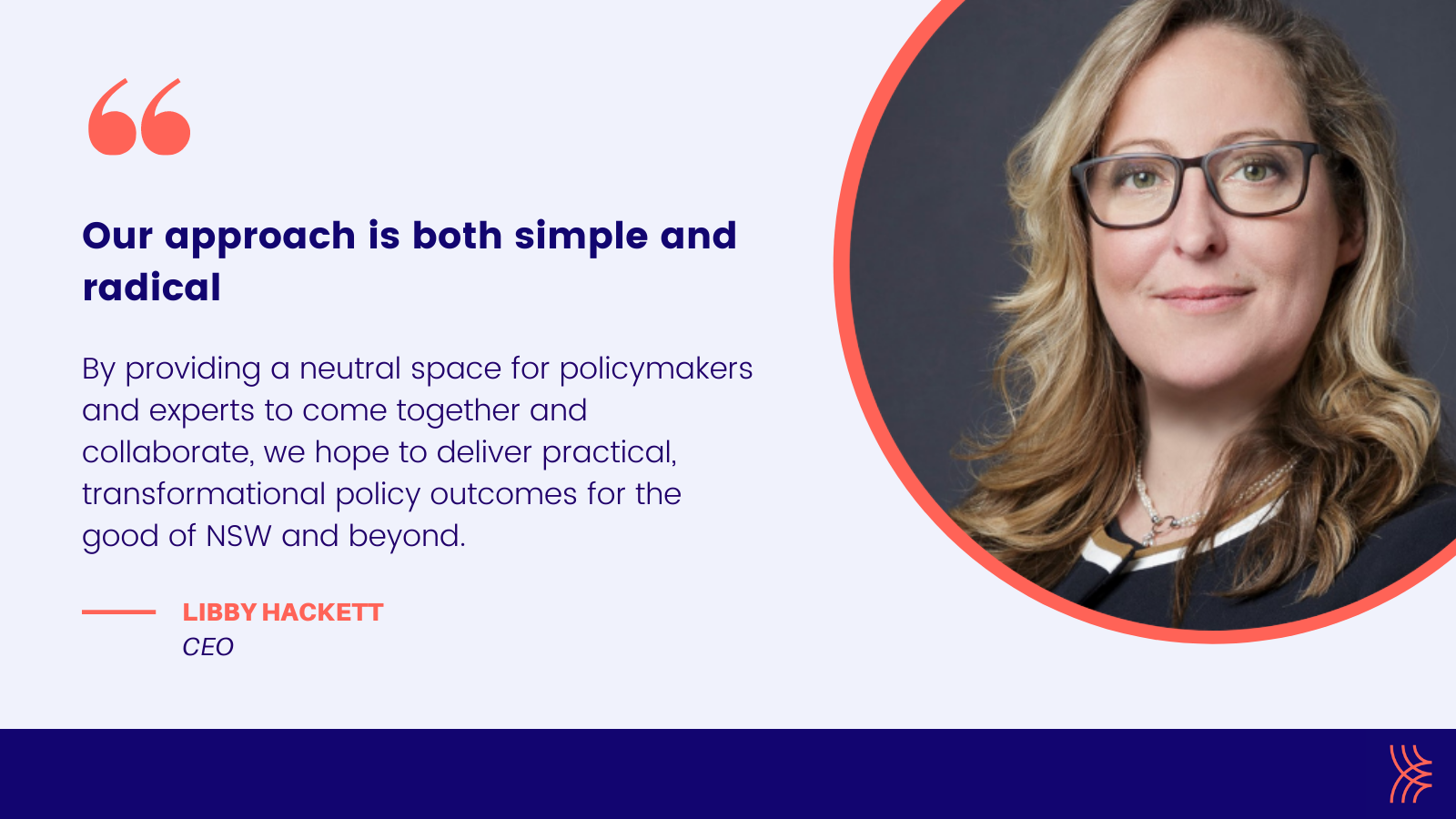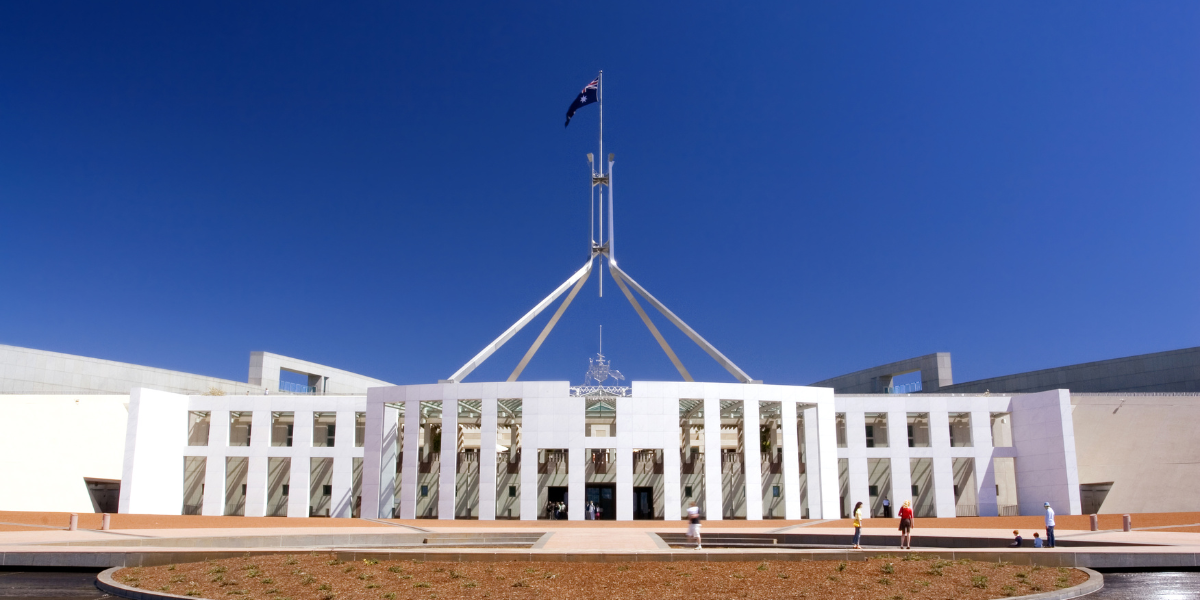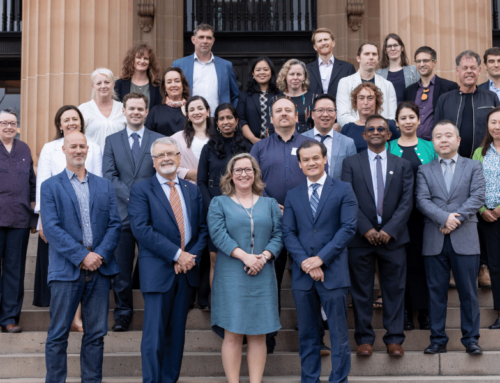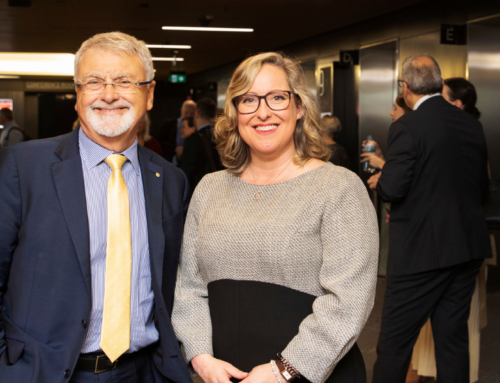Meet Libby Hackett, the CEO of the James Martin Institute for Public Policy. An award-winning public policy expert, Libby has held senior advisory and leadership roles in government, parliament, peak bodies, think tanks and private sector consultancy in Australia and the UK. In this interview, Libby talks about her interest in public policy, her passion for collaborative research and her plans for the James Martin Institute in the months ahead.
You’ve worked at the highest level of government and universities in the UK and Australia for many years. What drew you to the James Martin Institute?
I was drawn to the opportunity to bring those two worlds together in a very real and practical way. The James Martin Institute model brings government and leading universities together to forge joint Project Teams – they all have skin in the game and that creates huge opportunity for good.
Our approach is simple but radical – we’re forging joint project teams made up of government colleagues working alongside academic experts, practitioners, users and other experts to solve real-world policy problems. We are working with our partners, not for them, to demonstrate the power of genuine collaboration and joint working.
About the JMI
The James Martin Institute for Public Policy has been established by the NSW Government, in partnership with the University of Sydney, Western Sydney University and the University of Technology Sydney, as an independent institute that will transform how public policy is made in NSW and beyond.
It’s a brave model that requires a high level of trust and commitment from our partners to come together and work in this way, but the signs are promising – really promising. Collectively, we’re helping to build something that could genuinely transform how public policy is made and that, for me, is a privilege to be a part of.
A lot of your work has been focused on the intersection of public policy and academia. What inspired you to bring these fields closer together?
I certainly cannot take credit for bringing these two worlds together – or even wanting to – I am standing on the shoulders of many others who have been, and remain, committed to this cause. The James Martin Institute itself is part of a much larger global movement of people who are all dedicated to improving how evidence is used in public policy making. Whether we’re working in health, education, environmental policy, there are thousands of ‘knowledge brokers’ out there, committed to the cause of supporting and improving how public policy is made through harnessing world-leading evidence and expertise.
What inspired me? I have seen this done well, and I have seen this done poorly, and I remain convinced that closer partnership and collaboration is the way forward.
Expert advice without sufficient understanding of the context or reality of public policy making is rarely helpful and, conversely, public policy that is made without reference to experts is often short-lived.
– Libby Hackett
By providing a neutral space for policymakers and experts to come together and collaborate, we hope to deliver practical, transformational policy outcomes for the good of NSW and beyond.
New South Wales faces a complex set of public policy challenges: whether it’s about jobs, planning and infrastructure, the circular economy or climate change. What does the James Martin Institute bring to the table to help policy makers navigate this increasingly complex policy landscape?
Public policy making is hard. Our policymakers are smart, dedicated, professionals who share a commitment to the public good – they want to see better outcomes for the people of NSW.
Given both the complexity and the pace of their world, I firmly believe that the more practical and useful help we can provide, the better.
– Libby Hackett
By improving their access to the right experts, at the right time, with experienced facilitation and translation to be able to harness this expertise, the better informed the policy will be and – in theory – the better the policy outcomes are for NSW.
What’s unique about the way the James Martin Institute operates?
Unique is a high bar but our approach is distinct in a few ways. As an independent policy institute we have no agenda but we also don’t employ subject experts, and that is pretty rare for a policy institute. Of course, many of us are policy experts in our own fields but we’re not here to lead a particular program of work, we are here to facilitate a genuinely collaborative process – we’re here to help. Our role is to harness the expertise of others (often leading research experts from our member universities) in a way that supports government.
Our project model is also pretty unique in that we work with government, not for them. Our joint project teams require a hands-on approach from all sides. Our government colleagues sit on our Project Teams alongside academic colleagues and other experts. We’re also asking our academic colleagues to set aside their normal incentives and timeframes and get stuck in. The idea is both simple and radical, and the early signs are really exciting! Watch this space.
What can we expect from the James Martin Institute in the next 12 months?
We will have finished our second joint project by mid-December, and you can expect more to come across a range of policy areas over the next 12 months. In 2022, we’ll be announcing our first annual Grant Scheme with some exciting research themes for the year. Alongside this, we’ll be starting a series of engaging events, workshops, hubs and bootcamps.
We’re here to bring diverse groups of experts and voices together to tackle complex public policy issues and that’s what we’ll be doing.
– Libby Hackett
Whether it’s about economic growth and jobs, the future of healthcare, addressing challenges for regional education or finding ways to reduce domestic violence, we will be helping government to develop bold, well-informed approaches that will have a positive impact for NSW.
This is a ground-breaking model that the government and our universities have established for NSW – let’s see what we can achieve together and show how NSW can lead the way.









